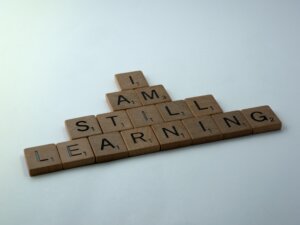
It’s definitely who we are on this site: trainers and developers–or should we say development managers or counselors, or guidance counselors, leadership directors? I admit we don’t hear those terms often in business (depending on our business, of course), but we could very easily hear them in another context or organization that has the same training goals as most organizations–to be a successful and productive group of people dedicated to the same vision. I could go on and on with a variety of terms that might define what we do with what is more often known as professional development.
Naturally, I found a good site for a simple definition and more information on the subject. According to the website, development is still training but at a higher level that involves not only an individual’s growth within the company, but personal growth as well. Here’s a bare-bones definition.
Development: Training people to acquire new horizons, technologies, or viewpoints. It enables leaders to guide their organizations onto new expectations by being proactive rather than reactive. It enables workers to create better products, faster services, and more competitive organizations. It is learning for growth of the individual, but not related to a specific present or future job.
Simple training is much more specific and limited.
Training: Learning that is provided in order to improve performance on the present job.
Now the question becomes, which comes first? Sure, training is most basic, but without the whole picture you don’t have anything to aim for. An effective training plan should be a strategic plan, involving a whole person, whole company aspect. The tactical measures we take to achieve certain goals, milestones, or results is the individual training. Do we make the mistake of making a list of skills we think are needed to create the perfect candidate? Or, do we break down the traits and skills we think our ideal candidate already has and try move others to that standard of proficiency?
However, we arrive at the solution doesn’t really matter; it’s a chicken or egg thing. What does matter is that we know what we want first and don’t just go making up courses because they are useful skills to have. We make already have those skills in abundance and can skip the developing and designing specific training. I say it is more useful to focus on the development, deciding what you want and what it takes to get there.
Wikipedia, too, also has its version: In the field of human resource management, training and development is the field concerned with organizational activity aimed at bettering the performance of individuals and groups in organizational settings. It has been known by several names, including employee development, human resource development, and learning and development. Training and development encompasses three main activities: training, education, and development.
The Wikipedia article also reports some experts consider these ideas to be synonymous. However, to practitioners, they encompass three separate, although interrelated, activities:
- Training: This activity is both focused upon, and evaluated against, the job that an individual currently holds.
- Education: This activity focuses upon the jobs that an individual may potentially hold in the future, and is evaluated against those jobs.
- Development: This activity focuses upon the activities that the organization employing the individual, or that the individual is part of, may partake in the future, and is almost impossible to evaluate.

The one you don’t hear very often in American circles is Education. Do we depend too much time considering the merits of specific subject matter studied to earn the Masters of Business Administration? Or, do we accept them blindly because they come from an Ivy League or otherwise prestigious business school? Do our people learn about our specific corporate culture? Obviously not. They learn about corporate culture in general, and about many different types of corporate cultures. Which type are we?
That brings up another training question. Should we examine our corporate culture like we would any part of our organization if we felt it may need an upgrade or new vision? Perhaps that in itself will be a worthwhile endeavor–getting to know ourselves better, or at least begin to see ourselves as others see us. It is only with this knowledge that an individual can move ahead in the company. So part of any professional development education should include the aspects of developing, refining, and evolving a corporate culture to create the corporate organization.
—
For more resources about training, see the Training library.
That’s just my opinion. What’s yours? Feel free to leave a comment or a question. You can read more of my views here or on a variety of subjects, including communication, training and development, and theatre arts on my website. For a look at the human side of training from my Cave Man perspective, please check out my book, The Cave Man Guide to Training and Development.
 Sections of this topic
Sections of this topic















